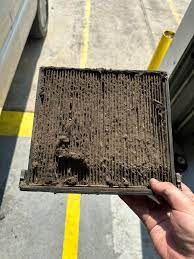Posted on 4/2/2024

Some Helpful Information Regarding Oil Changes. Over the last 3 years auto shops have seen their petroleum prices quadruple. Currently an oil and filter change using conventional oil will cost between $35 and $85, depending on your area. If your car requires synthetic oil, you should expect to pay more (anywhere from $75 to $125) but you make up some of the cost since synthetic oil lasts longer and has to be changed less frequently. Why the difference in pricing? There are valid reasons for this big span, mainly relating to your vehicle manufacturer choice of oil requirements. Conventional oil (made from fossil fuel) is the least expensive option. A blend of conventional and synthetic bases ( Synthetic Blend) is the next step up. The most expensive oil is fully synthetic. In addition: The price of your oil change will depend on a few factors, not only the type of oil used but the amount of oil required, ... read more
Posted on 3/18/2024

Don’t Get Stranded, We Can Help Vacation season is rapidly approaching and many of us will be headed out to our favorite places with our families. Before you head out on the road, why not drop off your vehicle for a pre-trip safety inspection and regular maintenance? Nobody wants any unexpected surprises while traveling with family, specifically If you have small children. Your vehicle is most likely the second most expensive purchase you will ever make, helping you maintain it is why we are here. Modern vehicles are very complicated and very fragile. If your vehicle was built during the Covid era, then you are very likely facing a vehicle failure of some type due to the poor quality workmanship and substandard parts used during manufacturing. We make things very convenient for you. Drop off your vehicle in the morning and pick it up when repairs are finished, usually the same day. Think of it like this. How much of an inconvenience wo ... read more
Posted on 2/27/2024

One of the most overlooked items on a vehicle is the cabin air filter. Cabin air filters are installed in your vehicles HVAC system and are designed to filter dirt, pollen and other disgusting things out of the air that you and your passengers breath inside the vehicle. They should be inspected at every oil change and changed every 12,000 miles or once a year. If neglected the filter becomes filled with debris and restricts the airflow, and less airflow means the cabin cannot be heated or cooled efficiently. A clogged filter also creates back pressure for the blower motor, making it work harder and contributing to possible premature failure. Most people think these filters are checked at every service when the vehicle is in the shop, but the truth is, many of these cabin filters are hard to access so shops with poorly trained employees may miss or skip this step. If you have asthma or other respiratory problems, it is imperative that these filters be changed ... read more
Posted on 12/15/2023
You wouldn’t believe how many times I’ve seen vehicles on the road with tires/wheels that are noticeably out of balance. To see this with the naked eye, the imbalance has to be pretty extreme, but believe me, I HAVE seen it! I’ve seen tires so badly imbalanced or damaged that they literally bounce up and down, some bouncing so high that they were lifting off the ground! We’ve had people come into our shop that were understandably upset about a vibration in their vehicle. This is frequently mis-diagnosed by some shops as bad brake rotors, but it usually turns out to be tires that are damaged or out of balance. Simple tire balancing is very inexpensive or free in most cases because almost every place that sells tires offers free lifetime tire balancing. One of the first questions we ask a customer when they deliver their vehicle to us with a vibration complaint is "When was the last time you had your tires balanced"? No one ever really ... read more
Posted on 10/26/2023
Arguably a vehicle’s most important safety system is its brakes. Specific components, including brake pads, shoes, rotors, drums and brake fluid are maintenance items that need regular replacement. A pulsation or shaking during braking can be a strong indication that the brake rotors are warped from excessive heat caused by extended or hard braking. It is important to change brake fluid every 20,000 miles or 2 years. As brake fluid ages, it begins to corrode parts such as brake lines, calipers, caliper pistons, and wheel cylinders. It can cause the ABS light to come on and will ultimately lead to reduced braking performance. It is not uncommon for the braking system hardware to move, become dislodged or even break. In Very basic terms the hardware is what holds the brake pads or shoes in place. This is very common on vehicles with drum brakes, but still happens on disc brakes. Modern braking systems are more complicated than the old ones, they include sensors, compu ... read more